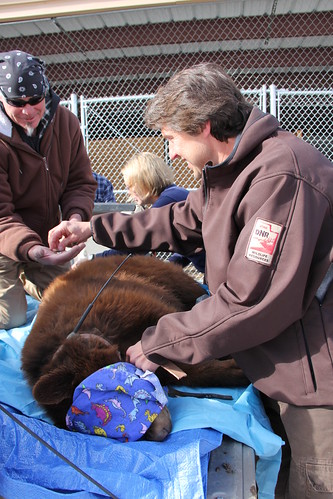Earlier this year (see July 31 blog), the USDA-APHIS Wildlife Services National Wildlife Research Center’s (NWRC) field station in Millville, Utah, agreed to house two orphaned black bear cubs as part of a collaborative rehabilitation effort with the Utah Division of Wildlife Resources (Division).
The bears did well in captivity gaining enough weight to be re-released into the wild in early November. The young bears arrived at the facility weighing approximately 30 pounds and left weighing over 120 pounds. The two young male bears were fed bear chow (similar to dog food), fish, nuts, and fresh fruits and vegetables donated from a local grocery store and farmers. In addition to being well-fed, the bears had plenty of enrichment opportunities in their pen including a tire swing, climbing trees and logs, and a mini swimming pool.
While at the field station, the bears had limited contact with humans. NWRC and Division researchers plan to follow the bears throughout their lives to see how or if their experiences in captivity influence their future interactions with people.
Outfitted with radio-collars and tags, the bears were released into a remote area outside of Price, Utah. The Division will monitor the bears this winter to ensure they adjust back to life in the wild.

Utah Division of Wildlife Resources’ mammals program coordinator John Shivik places a radio-collar on a black bear cub in preparation for its release. The Division will monitor the cub and its sibling who were recently housed at the NWRC Utah field station to ensure they adjust back to life in the wild. Photo by USDA Wildlife Services
“It was a great opportunity for us to study bears at our facility,” notes Dr. Julie Young, NWRC’s Utah field station leader. “Now that the bears have been released back into the wild, we’ll be able to follow them and any future rehab bears kept at our facility to see how their experiences here may influence their future interactions with people. This will help us develop better management strategies for bears.”
WS’ NWRC is the only Federal research organization devoted exclusively to resolving conflicts between people and wildlife through the development of effective, selective, and socially responsible methods, tools, and techniques. Experts at NWRC’s Utah field station focus on the development of new management tools to reduce conflicts with predators, including coyotes, wolves, bear, and mountain lion.

All grown up and ready to go. One of two orphaned black bear cubs peers out of his pen at the NWRC Utah field station. The rehabilitated bears were recently released back into the wild in Utah. Photo by USDA Wildlife Services
No comments:
Post a Comment
Note: Only a member of this blog may post a comment.